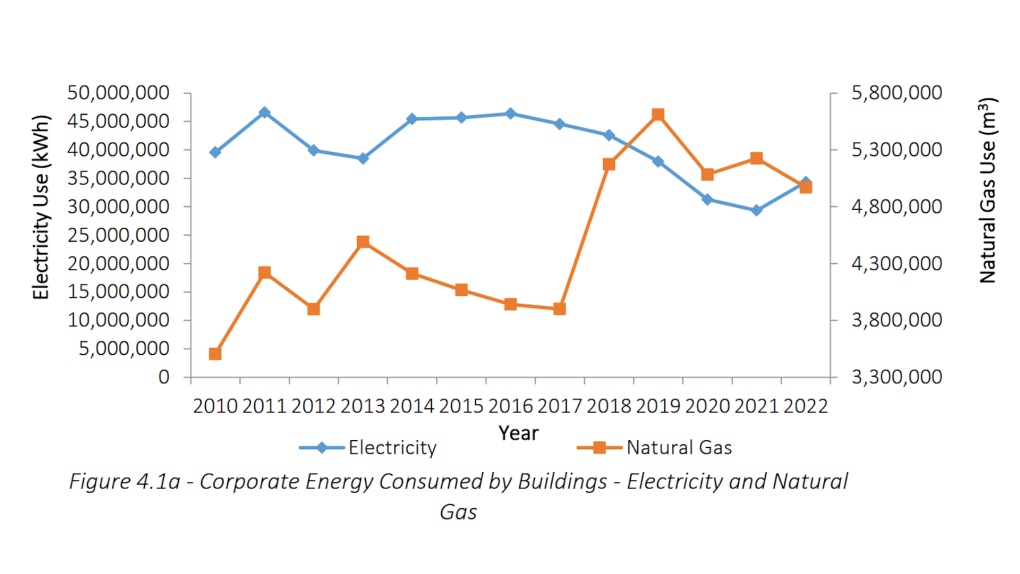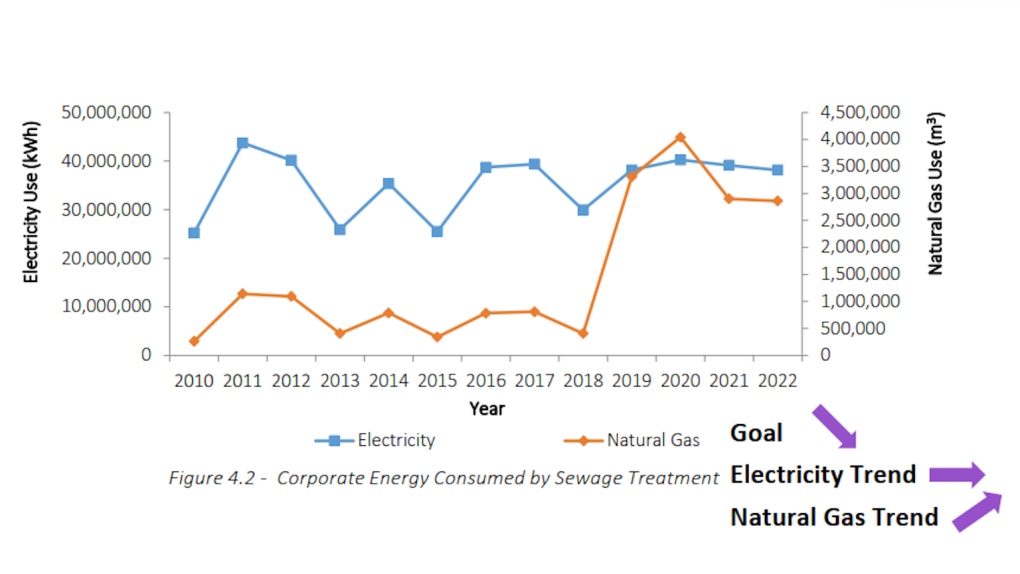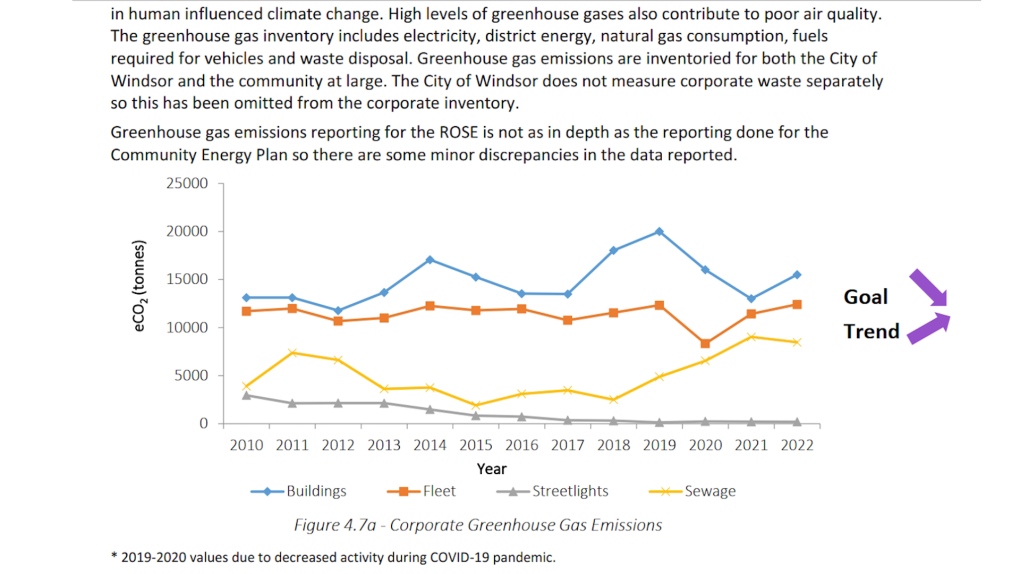Report identifies Windsor climate metrics 'trending in the opposite direction'

A report going before Windsor city councillors shows levels of corporate natural gas consumption, sewage treatment plant emissions and overall corporate emissions are "trending in the opposite direction" of the city's climate goals.
Windsor's first R.O.S.E. report, which stands for "Report On the State of our Environment," was completed in 2008 and is targeted for publication every five years, as part of the city's environmental master plan.
The 2023 R.O.S.E. report is being presented to Windsor city council during its April 22 meeting.
"Many of the environmental indicators are moving towards their desired goal. Of the indicators that received a negative result, many were not moving away from their goal but were unchanged," a portion of the report reads.
"However, three indicators are trending in the opposite direction of our goals – corporate natural gas consumption and sewage treatment plant natural gas consumption, and corporate emissions."
According to the 2023 R.O.S.E. report, city buildings use about half of the corporation’s energy use, with heating and cooling requirements representing the largest sources of energy consumption.
"Significant increases" in natural gas consumption between 2017 and 2019 correlated to the implementation of combined heat and power (CHP) units at the WFCU Centre, Huron Lodge, and Windsor International Aquatic and Training Centre, the report said.

The amount of energy used by city buildings in the process of treating sewage or wastewater has increased as well.
The report added the City of Windsor acquired a "biosolids pelletizing facility" in 2019, which resulted in higher corporate natural gas consumption for drying processes.
High water levels in the Great Lakes through 2019 and 2020 also resulted in higher amounts of wastewater "due to high ground water levels and system infiltration."
While greenhouse gas emissions from the community have been trending downward, data in the 2023 R.O.S.E. report shows corporate greenhouse gas emissions have been trickled upwards in recent years.
Sewage emissions increased by approximately 2,500 eCO2 tonnes in 2018 to around 8,500 eCO2 tonnes in 2022.
As another example, Municipal fleet vehicles accounted for 8,500 eCO2 tonnes in 2020. Four years later, they accounted for roughly 12,000 eCO2 tonnes.

"In order to align these trends to the goals, energy efficiency measures should be considered along with further expansion of renewable energy sources," the report said.
The 2023 R.O.S.E. report ended by saying that while the City of Windsor has pushed forward on "dozens of commendable plans, initiatives, studies and events" related to the climate, the city needs to do a better job conveying the successes of these initiatives residents and stakeholders.
"The lack of awareness of the City’s efforts to combat climate change has many residents feeling disconnected. This has fostered frustration about the contradiction of striving to reduce emissions while investing in automobile infrastructure," the report reads.
"Many concerns centered on the lack of greenery. Additionally, many residents vocalized their apprehension and discontent with construction on floodplain land. A push for decreasing urban sprawl by establishing high density areas surrounding critical infrastructure, such as hospitals were among other concerns."
The report highlighted Windsor residents' "disillusionment" with city leadership, citing a perceived lack of tangible progress despite existing plans and initiatives.

Concerns centred on the need for increased staff and resources to effectively protect the land and improve air and water quality, with residents feeling these goals are currently unattainable compared to other Ontario municipalities.
"The public would like to see improved community involvement and engagement initiatives that prioritize interaction with nature and build an emotional connection to environmental preservation."
Derek Coronado, coordinator for Citizens Environmental Alliance, said the data in the 2023 R.O.S.E report points to a "failure of the city" to adhere to its own committed targets for greenhouse gas emission reductions.
"Its buildings and the use of combined heat and power units, natural gas, obviously contribute to greenhouse gas emissions through methane," said Coronado. 'Those decisions were made really to attempt to reduce electricity consumption by relying more on gas. In terms of emissions, that's not such a good choice."
Coronado added transportation is another sector where the city can improve on its emissions output.
"The corporation isn't greening its fleet fast enough in terms of getting off of fossil fuel powered vehicles," he said.
According to the R.O.S.E. report, Transit Windsor has seven fully-electric buses and seven plug-in hybrids.
There are approximately 40 city buses — more than a third of the Transit Windsor fleet — which are currently older than 12 years "with many approaching 20 years of use."
CTVNews.ca Top Stories

Laws that could get Canadians in trouble in tourism hotspots
There are some laws in popular tourist destinations around the world that could land Canadian travellers in mild-to-serious trouble if they're not careful. Don't let these local laws land you in hot water during your next vacation abroad.
DEVELOPING Jasper evacuees forced into B.C. to flee fires told to make U-turn to Alberta for aid
Thousands of wildfire evacuees forced from Jasper National Park into British Columbia along smoke-choked mountain roads Monday night were directed Tuesday to make a wide U-turn and head home if they needed a place to stay.
Polar bear at Calgary Zoo died by drowning following 'crushing' injury
The Wilder Institute/Calgary Zoo has revealed the cause of death for polar bear Baffin last week.
Edmonton gas station employee found guilty of terrorism charges in the U.K.
An Edmonton man has been convicted of multiple charges under the Terrorism Act in the United Kingdom.
Trudeau hand-picking candidate in Montreal byelection riles aspiring contenders
Prime Minister Justin Trudeau's decision to hand-pick a candidate for a riding in an upcoming Montreal byelection isn't being well-received by three aspiring contenders who spent months campaigning only to be shunted aside.
Celine Dion lands in Paris amid reports of performance at the Olympics
Speculation is mounting that Celine Dion will make an appearance at the Paris Olympics after landing in the French capital days before the opening ceremony.
Quebec mom devastated after man who killed her daughter in hit-and-run gets out after 5 months
A Montreal-area mother is furious with Quebec's justice system because the man who killed her 25-year-old daughter in a 2022 hit-and-run was released from jail after only serving one-sixth of his sentence behind bars.
U.S. Secret Service director resigns after Trump assassination attempt
The director of the Secret Service resigned Tuesday in the aftermath of the assassination attempt against former U.S. president Donald Trump that unleashed an outcry about how the agency failed in its core mission to protect current and former presidents.
Waterloo, Ont. woman out thousands after car totalled in hit-and-run
A woman in Waterloo, Ont. is out thousands of dollars for a car crash she wasn’t involved in.


































